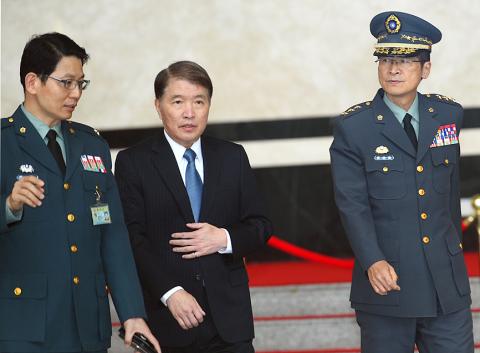Democratic Progressive Party (DPP) lawmakers yesterday identified major procedural abnormalities in a scandal-ridden navy shipbuilding program that resulted in Ching Fu Shipbuilding Co (慶富造船) securing the contract, with three top military officials, including former minister of national defense Kao Kuang-chi (高廣圻), urged to expound on their involvement in the case.
DPP Legislator Wang Ding-yu (王定宇) pointed to flaws in the tender process and subsequent program management by the Ministry of National Defense, which “revived” Ching Fu from potential disqualification.
Ching Fu, which in 2014 was awarded the NT$35.8 billion (US$1.19 billion at the current exchange rate) contract to build six minesweepers as part of a domestic warship program, secured the contract after the ministry lowered the minimum asset requirement for bidders from one-10th to one-200th of the contract’s value.

Photo: Chang Chia-ming, Taipei Times
That year, a ministry tender review committee — without its convener and deputy convener present — drew lots to pick a contractor for the minesweeper program, with Ching Fu securing the contract over CSBC Corp, Taiwan.
In 2015, Ching Fu failed to acquire export permits from its subcontractors, Italian shipbuilder Intermarine and US defense firm Lockheed Martin, but the ministry did not dissolve its contract, despite the failure.
State-run banks approved a syndicated loan of NT$20.5 billion to Ching Fu, even though the company was determined to be financially unstable, Wang said.
DPP Legislator Chuang Ruei-hsiung (莊瑞雄) questioned how Ching Fu, which has registered capital of about NT$500 million, was able to secure a tender worth NT$35.8 billion.
Kao, former navy commander-in-chief Tung Hsiang-lung (董翔龍) and former navy deputy commander-in-chief Pu Tze-chun (蒲澤春) should explain decisions that appear to be tailor-made for Ching Fu, Wang said, adding that they might have been pressured into the arrangement.
The ministry might begin the contract dissolution process with Ching Fu by the end of this month, when Intermarine and Lockheed Martin are expected to dissolve their contracts with the firm, Wang said, adding that Ching Fu is on the brink of bankruptcy and its employees have not been paid in months.
“The dissolution of Ching Fu’s contracts with its subcontractors and its bankruptcy constitute a condition for the military to terminate the contract,” Wang said.
Following dissolution of the contract, the ministry would keep Ching Fu’s NT$9 billion performance bond and demand compensation for losses, he added.

Taiwanese can file complaints with the Tourism Administration to report travel agencies if their activities caused termination of a person’s citizenship, Mainland Affairs Council Minister Chiu Chui-cheng (邱垂正) said yesterday, after a podcaster highlighted a case in which a person’s citizenship was canceled for receiving a single-use Chinese passport to enter Russia. The council is aware of incidents in which people who signed up through Chinese travel agencies for tours of Russia were told they could obtain Russian visas and fast-track border clearance, Chiu told reporters on the sidelines of an event in Taipei. However, the travel agencies actually applied

Japanese footwear brand Onitsuka Tiger today issued a public apology and said it has suspended an employee amid allegations that the staff member discriminated against a Vietnamese customer at its Taipei 101 store. Posting on the social media platform Threads yesterday, a user said that an employee at the store said that “those shoes are very expensive” when her friend, who is a migrant worker from Vietnam, asked for assistance. The employee then ignored her until she asked again, to which she replied: "We don't have a size 37." The post had amassed nearly 26,000 likes and 916 comments as of this

New measures aimed at making Taiwan more attractive to foreign professionals came into effect this month, the National Development Council said yesterday. Among the changes, international students at Taiwanese universities would be able to work in Taiwan without a work permit in the two years after they graduate, explainer materials provided by the council said. In addition, foreign nationals who graduated from one of the world’s top 200 universities within the past five years can also apply for a two-year open work permit. Previously, those graduates would have needed to apply for a work permit using point-based criteria or have a Taiwanese company

The Shilin District Prosecutors’ Office yesterday indicted two Taiwanese and issued a wanted notice for Pete Liu (劉作虎), founder of Shenzhen-based smartphone manufacturer OnePlus Technology Co (萬普拉斯科技), for allegedly contravening the Act Governing Relations Between the People of the Taiwan Area and the Mainland Area (臺灣地區與大陸地區人民關係條例) by poaching 70 engineers in Taiwan. Liu allegedly traveled to Taiwan at the end of 2014 and met with a Taiwanese man surnamed Lin (林) to discuss establishing a mobile software research and development (R&D) team in Taiwan, prosecutors said. Without approval from the government, Lin, following Liu’s instructions, recruited more than 70 software